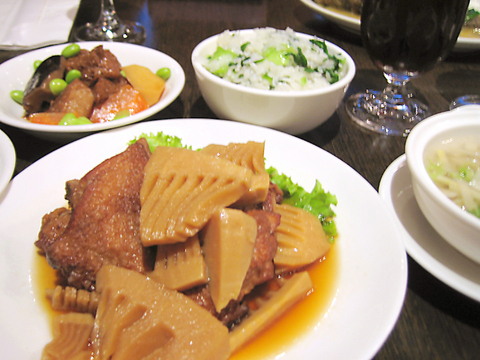There's a certain amazed feeling you get when you eat something delicious at a restaurant only to find out it's one of those foods that have made you grimace many times before. That's the feeling I got at Guangsheng Food Shop.
Don't be fooled by its humble name -- this place has class. It's hard to find but well worth a little searching. Coming out of Taipower Building Station's Exit 3, you turn right onto Shida Road. Walk toward Shida Night Market and turn right at the first stoplight -- Lane 39. This will turn onto Taishun Street, Lane 38, where you'll find Guangsheng on the left side.
The decor is very lounge and very Shanghai 1930s, especially in the basement area. Particularly charming are the antique posters with women in qipao advertising cigarettes and long-forgotten cure-alls. What does this have to do with the food, you ask? Well, Shanghai is right between Jiangsu and Zhejiang provinces, which are the source of most of the dishes on Guangsheng's menu.

PHOTO: MEREDITH DODGE, TAIPEI TIMES
Jiangzhe cuisine, as it's called, may not be as popular as Sichuan or Beijing cuisine, but Guangsheng definitely makes it taste as good. I was particularly impressed by the bamboo shoots in the braised chicken with bamboo shoots. This vegetable, which can make a lunchbox stink to high heaven, here has no offensive odor but rather a crispy lightness, like a savory version of the Asian pear. The chicken was savory too, and so tender I could pull the meat off the bone using only my chopsticks. I ate it skin and all, and I'm usually one to pick chicken skin off.
Savoriness, even saltiness, is a major theme in Guangsheng's menu, as can be tasted in the yellow fish with salted cabbage. I found this dish a little too salty, but as manager Peng Xiao-hui (
If the flavor gets to be too much for you, balance it out with the vegetable rice. After eating a bowl of this white rice mixed with chopped bok choy, you'll wonder why other restaurants don't follow suit and put a little something extra in their rice too.
Guangsheng Food Shop is closed on the second and fourth Tuesdays of the month.

June 9 to June 15 A photo of two men riding trendy high-wheel Penny-Farthing bicycles past a Qing Dynasty gate aptly captures the essence of Taipei in 1897 — a newly colonized city on the cusp of great change. The Japanese began making significant modifications to the cityscape in 1899, tearing down Qing-era structures, widening boulevards and installing Western-style infrastructure and buildings. The photographer, Minosuke Imamura, only spent a year in Taiwan as a cartographer for the governor-general’s office, but he left behind a treasure trove of 130 images showing life at the onset of Japanese rule, spanning July 1897 to

One of the most important gripes that Taiwanese have about the Democratic Progressive Party (DPP) is that it has failed to deliver concretely on higher wages, housing prices and other bread-and-butter issues. The parallel complaint is that the DPP cares only about glamor issues, such as removing markers of Chinese Nationalist Party (KMT) colonialism by renaming them, or what the KMT codes as “de-Sinification.” Once again, as a critical election looms, the DPP is presenting evidence for that charge. The KMT was quick to jump on the recent proposal of the Ministry of the Interior (MOI) to rename roads that symbolize

On the evening of June 1, Control Yuan Secretary-General Lee Chun-yi (李俊俋) apologized and resigned in disgrace. His crime was instructing his driver to use a Control Yuan vehicle to transport his dog to a pet grooming salon. The Control Yuan is the government branch that investigates, audits and impeaches government officials for, among other things, misuse of government funds, so his misuse of a government vehicle was highly inappropriate. If this story were told to anyone living in the golden era of swaggering gangsters, flashy nouveau riche businessmen, and corrupt “black gold” politics of the 1980s and 1990s, they would have laughed.

It was just before 6am on a sunny November morning and I could hardly contain my excitement as I arrived at the wharf where I would catch the boat to one of Penghu’s most difficult-to-access islands, a trip that had been on my list for nearly a decade. Little did I know, my dream would soon be crushed. Unsure about which boat was heading to Huayu (花嶼), I found someone who appeared to be a local and asked if this was the right place to wait. “Oh, the boat to Huayu’s been canceled today,” she told me. I couldn’t believe my ears. Surely,